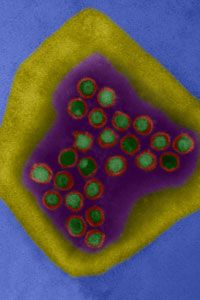It's not a subject mentioned real often on The Hills or American Idol, but it's a lot more relevant to our daily lives than those important shows: Herpes reportedly affects up to 80 percent of the U.S. population [source: HerpesOnline].
Yes, four out of five people have the herpes simplex virus (HSV), which causes those cold-sore blisters you sometimes see around people's lips. That's oral herpes, almost always caused HSV-1 and contracted in childhood. HSV-1 spreads like wildfire among kids -- it's passed by the briefest skin-to-skin contact, as simple as one HSV-carrying child touching a sore and then another kid in class.
Advertisement
Oral herpes is more common than the other, sexually transmitted type: HSV-2, the dreaded genital herpes. According to the CDC, just over 16 percent of Americans have genital herpes, primarily characterized by blisters, which then break and become sores, around any or all genital areas, including vagina, penis, anus, and buttocks [source: CDC].
Perhaps more troubling than the high infection rate for genital herpes is the fact that 85 percent of infected individuals don't know they have it [source: HerpesOnline]. With a virus that's pretty easily spread via both sexual intercourse and oral sex, that's problematic, to say the least.
It seems like it would be tough to miss the genital sores that characterize an HSV-2 flare-up and so avoid spreading the virus. Unfortunately, it's not that simple.
In this article, we'll find out precisely how herpes spreads and why extraordinary caution is required if you or your partner has or might have the disease. We'll also check out some practices that can reduce the likelihood of passing it on or contracting it.
Chances are, if you have herpes, you contracted it when your partner was having a flare-up. But recognizing a flare-up isn't as easy as it seems.
Advertisement


